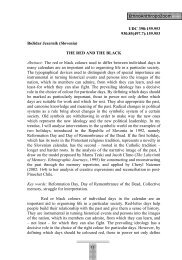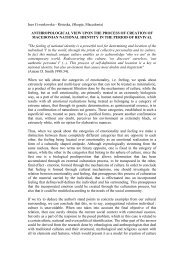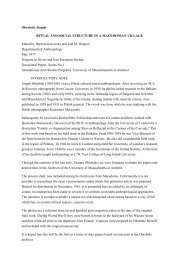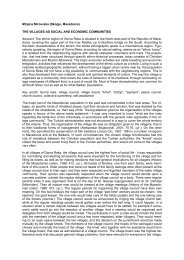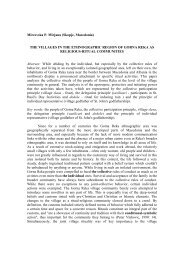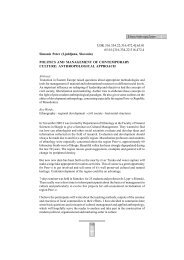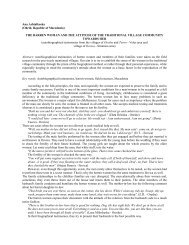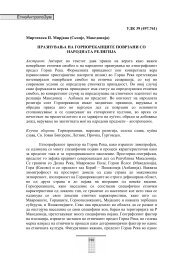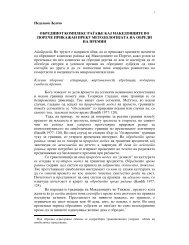Halpern M. Joel, Kerewsky-Halpern Barbara (USA)
Halpern M. Joel, Kerewsky-Halpern Barbara (USA)
Halpern M. Joel, Kerewsky-Halpern Barbara (USA)
Create successful ePaper yourself
Turn your PDF publications into a flip-book with our unique Google optimized e-Paper software.
12345<br />
12345<br />
12345<br />
12345<br />
12345<br />
12345<br />
12345<br />
12345<br />
12345<br />
12345<br />
12345678901234567890123456789012123<br />
12345678901234567890123456789012123<br />
EthnoAnthropoZoom<br />
12345678901234567890123456789012123<br />
12345678901234567890123456789012123<br />
12345678901234567890123456789012123<br />
and south in the direction of Ni{ (a major city in Serbia near the Bulgarian border). So,<br />
about l5 kilometers from our village, we took our last look at the landscape we had<br />
come to know so well. Who knows when we will see it again? The track followed the<br />
Morava River, which marks the eastern boundary of {umadija.<br />
Gradually we passed out of the area of gentle hills and, still in the Morava basin,<br />
traveled higher into the system of the Rhodope Plateau which projects into the eastern<br />
part of Serbia from Bulgaria. The house types gradually changed from the whitewashed<br />
mud and brick {umadijan homes with red tiled roofs to homes more open in design,<br />
with porches and arcades. Often they were partly of wood.<br />
We passed through the city of Ni{, near which there is a famous spa, Ni{ka Banja.<br />
There is a folk song about the supernatural power the mineral water gives young men.<br />
Past Ni{ we con-tinued in the vicinity of the Morava, called the Southern Morava here.<br />
Outside the town of Leskovac we saw a factory which had been planned with a seeming<br />
magnificence with a big formal garden in front. It is now completely abandoned, with<br />
broken windows and crumbling trim, although the red star on top is still in good<br />
condition. Later we saw another factory under construction. All that was up was the<br />
wooden frame but already the red star had been hung on wires, appearing to dangle in<br />
mid air in a space between the framework.<br />
We passed the settlement of DŽep, Turkish for pocket, and the town of’ Vladi~in Han<br />
where we saw peasants returning from market. The landscape now changed rapidly.<br />
The flax in this area is relatively famous. In swampy ditches near the roadbed were<br />
bundles of flax soaking. The women all wore dark, hand-woven striped skirts, very full,<br />
with a trim of black lace on the hem, whether they were working in the fields or returning<br />
from the pijac. In many places marshes were overgrown with wild yellow swamp irises<br />
and tall reeds. Later on, in open fields, it was even prettier with the tall grasses dotted<br />
with white and purple wild flowers and brilliant red poppies.<br />
Entering a Moslem area we saw the white silhouettes of a minaret in the center of the<br />
cluster of community buildings. The men wore cotton skullcaps, turbans or fezzes. The<br />
women were not wearing the baggy pants we had seen worn by the Moslem women in<br />
Bosnia. One surprising thing was the number of horses. Although this was supposed<br />
to be a poorer area, it did not appear so to us. In {umadija, central Serbia, we had<br />
become accustomed to seeing cows do the work of horses in the less prosperous<br />
households. There was flat, fertile land, a good supply of horses, and relatively welldressed<br />
peasants. New for us was the sight of water buffalo. They appeared increasingly<br />
common as we proceeded further south.<br />
At about 4:30 in the afternoon, the train crossed the Vardar and, after the slums of<br />
Skopje on the city outskirts, we pulled into the railroad station. Waiting at the station<br />
were hansom cabs with horses, but we found a nosa~ or porter with a wheelbarrow to<br />
get us to the hotel. We had sent a telegram to be sure of a room. The desk clerk was not<br />
sure if we had asked for the najjeftinija, cheapest, or naifinij, the finest. We assured<br />
him that we wanted the cheapest So for 400 dinars, or $1.30, a night we settled into a<br />
129<br />
12345<br />
12345



